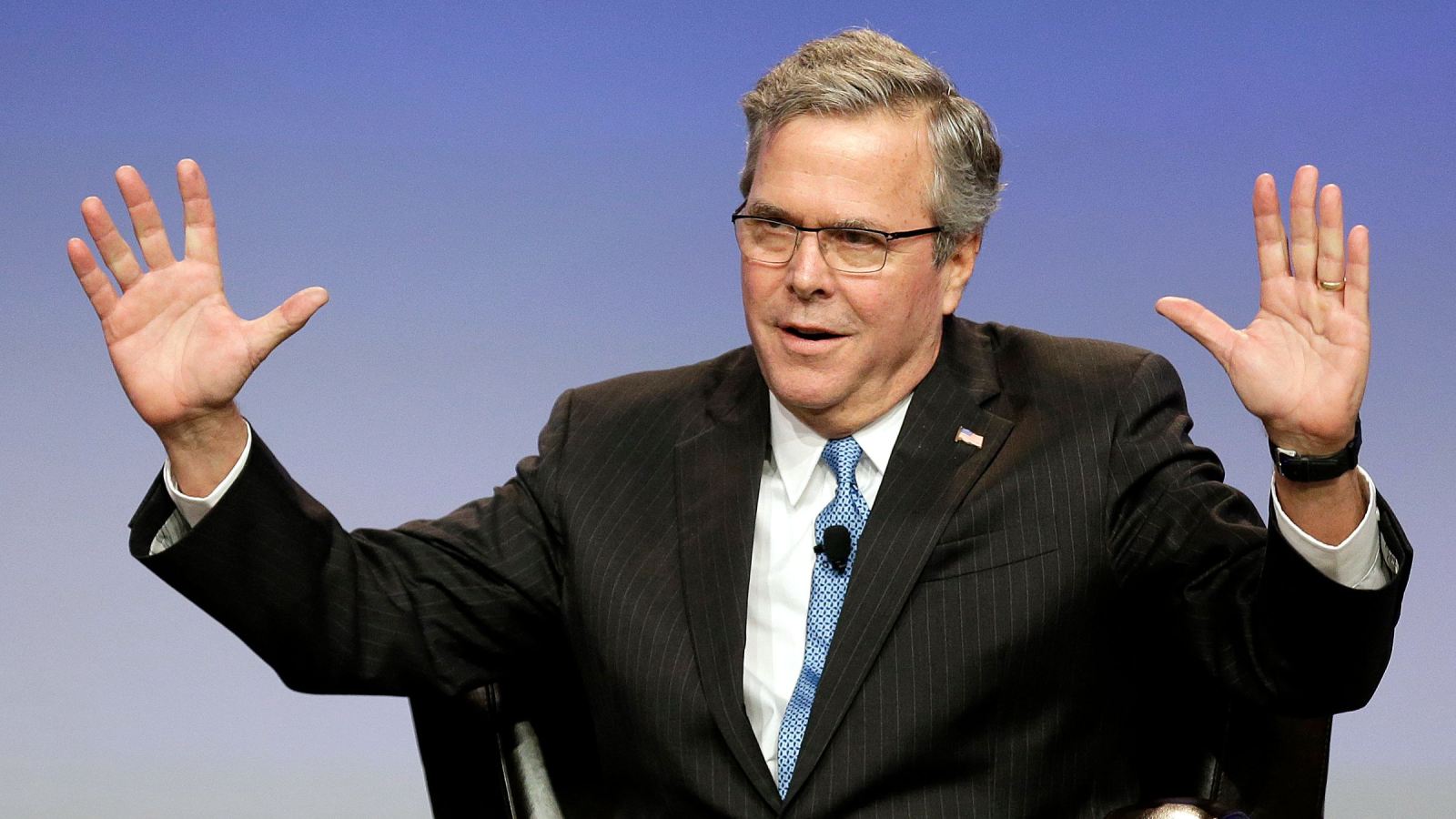
Donald Trump is «uninformed» — but would be a better president than Hillary Clinton, according to GOP presidential candidate Jeb Bush.
Bush, knocked off the top of the Republican pack earlier this year by Trump, made the comments about the business mogul on Sunday on CBS’s «Face the Nation» in response to a question about Trump’s calls for a national database to track Muslims.
«Look, I just think he’s uninformed. He knows what he’s saying. He’s smart. He’s playing you guys like a fiddle, the press, by saying outrageous things and garnering attention,» Bush told moderator John Dickerson. «That’s his strategy, is to dominate the news. The simple fact is that he’s been wrong on Syria and on the refugees pretty consistently. And no one’s holding him to account. He first said we had no interest in being involved in Syria. And then he said let the Russians take out ISIS. And then he said let ISIS take out [Syrian President Bashar al-]Assad. Back and forth it goes. And the net effect of this is — in these really serious times, he’s not a serious leader.» ISIS is an alternative acronym for the Islamic State militant group.
Given Bush’s concerns, Dickerson asked, why would he support Trump if the latter wins the Republican presidential nomination, as he has vowed to do.
«Because anybody is better than Hillary Clinton,» Bush said. «Let me just be clear about that. But I have great doubts about Donald Trump’s ability to be commander in chief. I really do. I wanted to give him the benefit of the doubt to see how the campaign unfolded. But if you listen to him talk, it’s kind of scary, to be honest with you, because he’s not a serious candidate. He doesn’t talk about the issues at hand that are of national security importance for our country. To keep us safe is the first priority of the president. And he’s all over the map, misinformed at best and preying on people’s fears at worst.»
Bush has regularly attacked Trump’s temperament and position on various issues, but this talk of an «uninformed» or «scary» opponent who is «preying on people’s fears» is a little sharper than normal.
During an extended exchange on Syria, Bush told Dickerson that ultimately he would defer to military commanders about the potential deployment of tens of thousands of U.S. forces to fight the Islamic State.
«If I’m commander in chief, my first order is ‘Give me options,’ and if the military force says we need a force of x thousand and this is the best way to destroy ISIS, then I would take that under advisement for sure,» he said. «I believe most people that I’ve talked to — military leaders — think that we can’t do this alone, but it’s going to require more effort than we have right now.»
Bush also said that he doesn’t think the United States will ever convince Russian President Vladimir Putin to drop his support for Assad.
«I have grave doubts whether Russia would make that big kind of sea change,» he said. «But we always should be in dialogue with Russia. My problem is — talking to Russia from a position of weakness only enables their objectives. It has nothing to do with ours. If we were stronger, we’d be in a better position to deal with them.»
Bush is scheduled to campaign Monday and Tuesday in Iowa before holding a fundraiser and appearing at the Republican Jewish Coalition meeting in Washington on Thursday. Next weekend he’s set to host several of his top campaign donors at a private meeting near his home base in Miami.
Related:
The dangerous circular logic of Donald Trump



Expositores: Oscar Vidarte (PUCP) Fernando González Vigil (Universidad del Pacífico) Inscripciones aquí. Leer más
Una retrospectiva para entender los próximos cuatro años. Leer más
En la conferencia se hará una presentación de los temas más relevantes del proceso de negociación se llevó a cabo desde el 2012, así como del acuerdo de paz firmado entre el Gobierno colombiano y la guerrilla de las FARC a finales del 2016. Se analizarán los desafíos y las... Leer más
El Observatorio de las Relaciones Peruano-Norteamericanas (ORPN) de la Universidad del Pacífico es un programa encargado de analizar y difundir información relevante sobre la situación política, económica y social de Estados Unidos y analizar, desde una perspectiva multidisciplinaria, su efecto en las relaciones bilaterales con el Perú.
© 2026 Universidad del Pacífico - Departamento Académico de Humanidades. Todos los derechos reservados.

